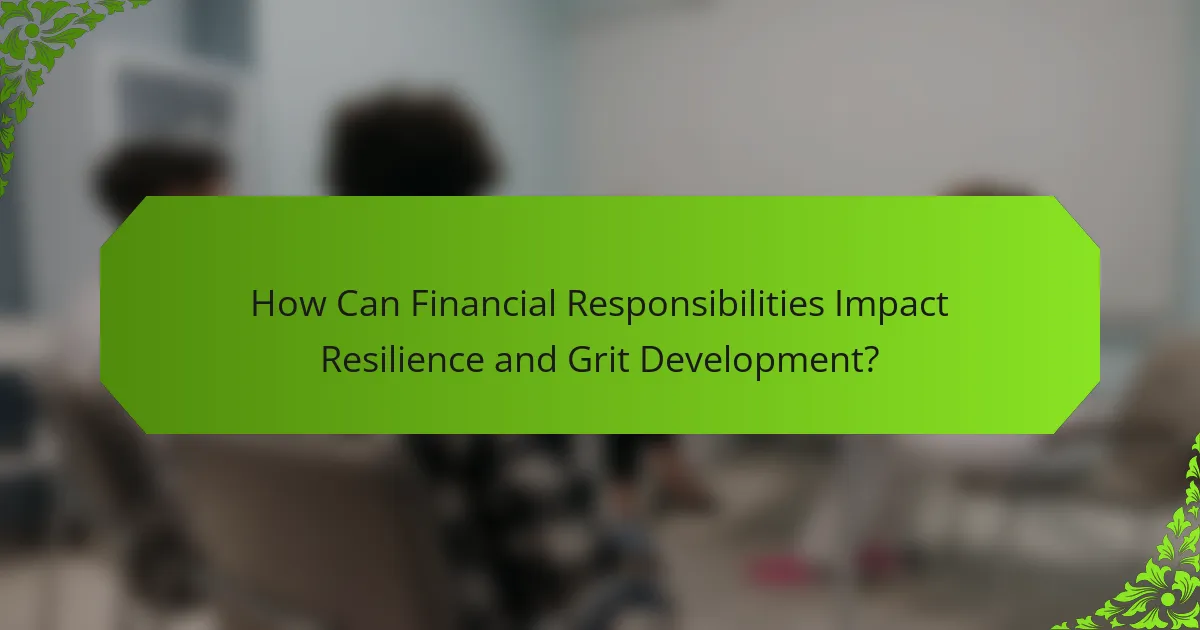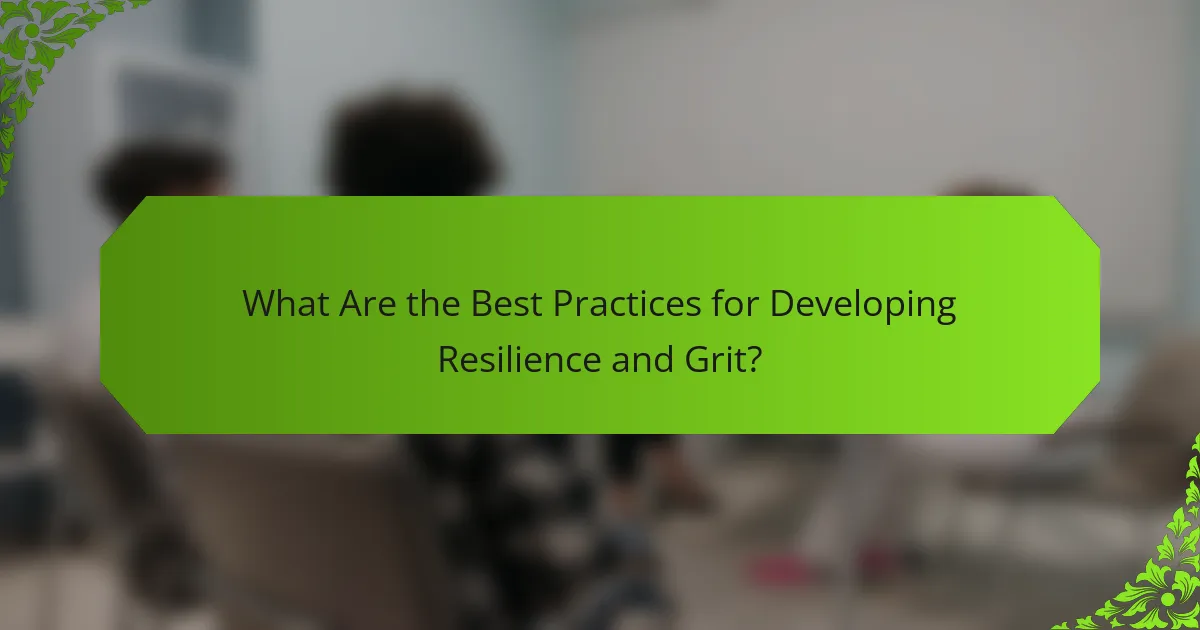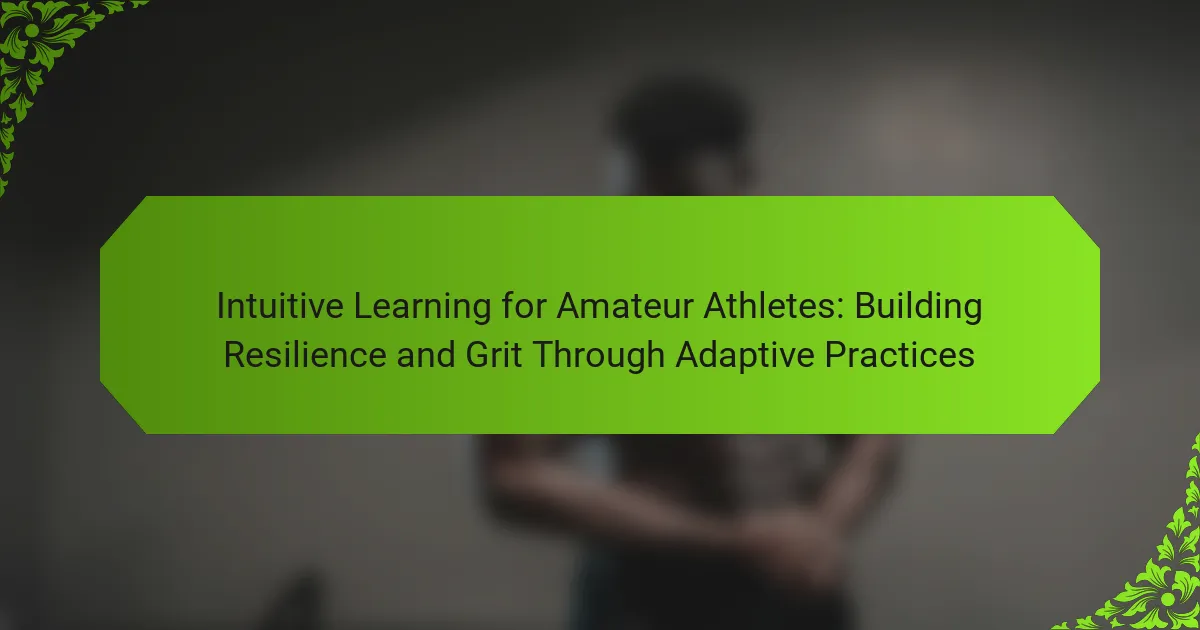Building resilience and grit is crucial for amateur athletes facing challenges while managing financial responsibilities. This article explores effective strategies such as setting realistic goals, embracing failure, and developing a growth mindset. It emphasizes the importance of time management and establishing a support network to enhance motivation. Additionally, engaging in diverse activities fosters adaptability and coping strategies during setbacks.

What is Resilience and Grit in the Context of Amateur Athletics?
Resilience and grit in amateur athletics are essential for overcoming challenges and achieving success. Building resilience involves developing mental toughness and adaptability, while grit refers to perseverance and passion for long-term goals. Young athletes can foster these traits by setting achievable goals, maintaining a positive mindset, and learning from setbacks. Engaging in consistent training and seeking mentorship further strengthens resilience and grit, enabling athletes to thrive even while balancing work and sports.
How do Resilience and Grit Impact Athletic Performance?
Resilience and grit significantly enhance athletic performance by fostering mental toughness and perseverance. These qualities enable amateur athletes to overcome challenges and maintain focus despite setbacks. Developing resilience helps athletes adapt to stress, while grit drives long-term commitment to training and competition. Studies show that athletes with high resilience and grit are more likely to achieve their goals and excel in their sport.
What are the Psychological Benefits of Developing Resilience and Grit?
Developing resilience and grit offers significant psychological benefits for amateur athletes earning money in childhood. These qualities enhance emotional stability, improve stress management, and foster a growth mindset. As a result, athletes become more adaptable to challenges, leading to increased motivation and goal achievement. Resilience helps them navigate setbacks, while grit ensures sustained effort towards long-term objectives. This combination builds confidence and promotes mental well-being, essential for balancing sports and financial responsibilities.

What Universal Practices Foster Resilience and Grit for Young Athletes?
Young athletes can build resilience and grit through consistent practice, goal setting, and positive reinforcement. Developing a growth mindset helps them view challenges as opportunities. Engaging in diverse sports enhances adaptability and fosters teamwork skills. Setting realistic goals allows for measurable progress, reinforcing determination. Regular feedback from coaches and peers builds confidence and encourages perseverance.
How Can Goal Setting Enhance Resilience?
Goal setting enhances resilience by providing clear objectives and a sense of direction. It helps amateur athletes focus on progress and maintain motivation despite challenges. Setting specific, measurable goals fosters a growth mindset, enabling athletes to adapt and overcome setbacks. Research shows that individuals with defined goals are more likely to persist through difficulties, reinforcing their grit. This structured approach not only builds resilience but also enhances overall performance and satisfaction in their athletic journey.
What Role Does Positive Self-Talk Play?
Positive self-talk enhances resilience by fostering a growth mindset in amateur athletes. It helps them overcome challenges, maintain motivation, and build grit. Studies show that athletes who practice positive self-talk experience improved performance and reduced anxiety. This mental strategy allows young athletes to navigate setbacks while earning money, reinforcing their determination and focus on long-term goals.
How Can Mindfulness Techniques Support Grit Development?
Mindfulness techniques enhance grit development by fostering focus and emotional regulation. These practices help amateur athletes manage stress and maintain motivation, crucial for resilience. Techniques such as meditation and breathing exercises improve mental clarity, allowing athletes to push through challenges. As a result, consistent mindfulness practice can significantly increase perseverance and determination in sports.

What Unique Strategies Can Amateur Athletes Use to Build Resilience?
Amateur athletes can build resilience through unique strategies such as setting realistic goals, embracing failure, and developing a growth mindset. These approaches foster mental toughness and adaptability.
Setting realistic goals helps athletes maintain motivation and track progress. For example, breaking down larger objectives into smaller, achievable milestones can enhance focus and reduce overwhelm.
Embracing failure is crucial. Athletes should view setbacks as learning opportunities rather than defeats. This perspective encourages persistence and resilience in the face of challenges.
Developing a growth mindset allows athletes to believe in their ability to improve through effort and practice. This mindset cultivates resilience by encouraging continuous learning and adaptation.
Incorporating these strategies while managing financial responsibilities can further enhance an athlete’s ability to persevere and thrive.
How Can Embracing Failure Lead to Greater Grit?
Embracing failure cultivates resilience and grit by teaching valuable lessons and fostering perseverance. When amateur athletes face setbacks, they develop a growth mindset, viewing challenges as opportunities for improvement. This process enhances their ability to adapt and strive for success despite difficulties.
Research indicates that individuals who learn from failure are more likely to persist in their efforts, leading to greater achievements over time. For instance, a study found that athletes who experienced early failures often demonstrated increased determination and focus in subsequent competitions.
Moreover, embracing failure can boost confidence. As athletes navigate obstacles, they build self-efficacy, reinforcing their belief in their abilities. This confidence is crucial for young athletes balancing sports and earning money, as it helps them manage stress and maintain motivation.
In summary, embracing failure is essential for developing grit and resilience. It equips amateur athletes with the skills needed to overcome challenges, ultimately leading to personal and athletic growth.
What Are the Benefits of Seeking Mentorship?
Seeking mentorship provides numerous benefits for amateur athletes, including guidance, motivation, and networking opportunities. Mentors can share valuable experiences that enhance resilience and grit, essential traits for success in sports. They offer personalized feedback, helping athletes identify strengths and weaknesses, which fosters growth. Additionally, mentorship can lead to financial opportunities, as mentors often connect athletes with sponsors or resources. This support system significantly contributes to an athlete’s development and overall success.

What Rare Attributes Contribute to Exceptional Resilience in Young Athletes?
Exceptional resilience in young athletes is influenced by rare attributes like adaptability, emotional intelligence, and intrinsic motivation. These qualities enable athletes to navigate challenges effectively. Adaptability allows them to adjust training methods and strategies based on performance feedback. Emotional intelligence helps them manage stress and build strong relationships with coaches and teammates. Intrinsic motivation fosters a deep commitment to their sport, driving them to overcome obstacles. Cultivating these attributes can significantly enhance resilience, leading to long-term success in athletics.
How Does Community Support Influence Grit?
Community support significantly enhances an amateur athlete’s grit by providing emotional encouragement and practical resources. Supportive environments foster resilience through shared experiences and motivation. Research indicates that athletes with strong community backing exhibit higher persistence in overcoming challenges. This network also offers valuable mentorship, which can lead to improved performance and personal growth. Ultimately, community engagement cultivates a sense of belonging, reinforcing the athlete’s commitment to their goals.
What Unique Challenges Do Young Athletes Face While Earning Money?
Young athletes face unique challenges while earning money, including time management, pressure to perform, and balancing education. These factors can strain their mental health and hinder athletic development. For instance, young athletes may struggle with prioritizing training and competition while fulfilling academic responsibilities, leading to burnout. Additionally, financial incentives can create performance anxiety, affecting their enjoyment of sports. Developing resilience and grit is essential for overcoming these obstacles, helping them thrive both as athletes and individuals.

How Can Financial Responsibilities Impact Resilience and Grit Development?
Financial responsibilities can significantly enhance resilience and grit development in amateur athletes. Managing finances fosters discipline, time management, and problem-solving skills. These attributes are essential for overcoming challenges in sports. For example, balancing training with part-time work teaches prioritization and commitment. As a result, athletes often develop a stronger mindset and adaptability, crucial for both sports and life. Engaging in financial tasks also builds confidence, reinforcing the belief that they can tackle difficulties. Thus, financial responsibilities play a pivotal role in shaping resilient and gritty athletes.
What Time Management Skills are Essential for Balancing Sports and Work?
Effective time management skills for balancing sports and work include prioritization, scheduling, and goal-setting. Prioritization helps identify essential tasks, ensuring athletes focus on what matters most. Scheduling involves creating a structured routine that allocates time for training, work, and rest, enhancing productivity. Goal-setting establishes clear objectives, motivating athletes to stay committed and organized. By mastering these skills, amateur athletes can develop resilience and grit while managing their responsibilities effectively.
How Can Young Athletes Learn Financial Literacy to Enhance Resilience?
Young athletes can learn financial literacy to enhance resilience by integrating money management skills into their training. Understanding budgeting, saving, and investing helps them navigate financial challenges and fosters a sense of independence.
Practical strategies include setting financial goals, tracking expenses, and learning about income sources, such as part-time jobs or sponsorships. These experiences develop grit, as athletes face and overcome financial obstacles.
Incorporating financial literacy into sports programs can also provide valuable lessons in responsibility and decision-making, reinforcing resilience. Workshops and mentorship can further support young athletes in building these essential skills.
By mastering financial concepts, young athletes not only prepare for their sports careers but also cultivate life skills that enhance their overall resilience.

What Are the Best Practices for Developing Resilience and Grit?
To develop resilience and grit as an amateur athlete while earning money in childhood, focus on setting clear goals, maintaining a balanced schedule, and cultivating a positive mindset. Prioritize time management to balance training, competition, and work commitments effectively. Establishing a support network can enhance motivation and accountability. Regular self-reflection on experiences and challenges fosters growth and adaptability. Engaging in diverse activities can build versatility and resilience, enabling better coping strategies during setbacks.
What Common Mistakes Should Young Athletes Avoid?
Young athletes should avoid overtraining, neglecting nutrition, and ignoring mental health. These mistakes can hinder performance and resilience.
Overtraining leads to burnout and injuries, disrupting athletic progress. Proper nutrition fuels the body, enhancing endurance and recovery. Neglecting mental health can diminish motivation and focus, essential for success.
Additionally, young athletes should avoid comparing themselves to others, which can undermine confidence. Instead, they should set personal goals and celebrate small achievements.
Lastly, disregarding feedback from coaches can stunt growth. Embracing constructive criticism fosters improvement and resilience, essential traits for amateur athletes.
How Can Parents Support Their Children in Building Resilience?
Parents can support their children in building resilience by encouraging a growth mindset and fostering independence. They should provide opportunities for children to face challenges and learn from failures. Positive reinforcement helps build confidence. Engaging in physical activities teaches perseverance and grit, essential traits for amateur athletes. Setting realistic goals can aid in developing resilience as children learn to navigate setbacks.
What Expert Insights Can Help Young Athletes Thrive?
Young athletes can thrive by developing resilience and grit through structured mental training, balanced routines, and financial literacy. Building resilience involves setting realistic goals, learning from setbacks, and maintaining a positive mindset. Grit can be cultivated by embracing challenges and persisting in the face of adversity.
Incorporating financial education helps young athletes manage earnings from sports. Understanding budgeting, saving, and investing fosters responsibility and prepares them for future financial independence. This holistic approach nurtures both athletic and personal growth, ensuring young athletes not only excel in their sport but also in life.



